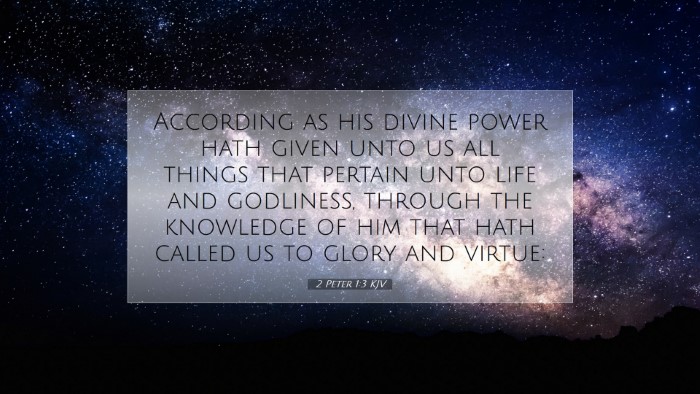Old Testament
Genesis Exodus Leviticus Numbers Deuteronomy Joshua Judges Ruth 1 Samuel 2 Samuel 1 Kings 2 Kings 1 Chronicles 2 Chronicles Ezra Nehemiah Esther Job Psalms Proverbs Ecclesiastes Song of Solomon Isaiah Jeremiah Lamentations Ezekiel Daniel Hosea Joel Amos Obadiah Jonah Micah Nahum Habakkuk Zephaniah Haggai Zechariah Malachi2 Peter 1:3
2 Peter 1:3 KJV
According as his divine power hath given unto us all things that pertain unto life and godliness, through the knowledge of him that hath called us to glory and virtue:
2 Peter 1:3 Bible Commentary
Commentary on 2 Peter 1:3
Verse: 2 Peter 1:3: "According as his divine power hath given unto us all things that pertain unto life and godliness, through the knowledge of him that hath called us to glory and virtue."
Introduction
This verse encapsulates the essence of the Christian life and the foundational principles guiding believers in their spiritual journey. The Apostle Peter, guided by the Holy Spirit, unfolds crucial theological concepts that bolster faith and encourage practical living.
The Divine Power
Matthew Henry's Commentary: Henry highlights that the "divine power" refers to the active, sovereign authority of God which is at work in the believers’ lives. This power is not abstract but manifests in the transformation and sustenance of the believer's life. It underscores an assurance that believers have access to divine capabilities essential for spiritual growth.
Albert Barnes' Exposition: Barnes emphasizes that the divine power of God is the source from which all blessings and capabilities flow. He proposes that God's power equips the believer for all demands of life and godliness, suggesting that reliance on oneself is insufficient.
Adam Clarke's Commentary: Clarke elaborates that this divine power empowers believers to live their lives in accordance with God’s will. He stresses that it facilitates holiness, righteousness, and genuine devotion in every aspect of life.
All Things Pertaining to Life and Godliness
Matthew Henry's Insight: Henry notes that the phrase "all things that pertain unto life and godliness" signifies that God has provided everything necessary for physical existence and spiritual vitality. The understanding of 'life' encompasses not only the physical sustenance but a deeper, more meaningful existence in Christ.
Albert Barnes' Perspective: Barnes discusses that "life" and "godliness" are comprehensive constructs encompassing every facet of life, covering moral and spiritual dimensions. He indicates that this provision is complete and sufficient, leaving no need for human effort to gain what has already been granted through divine generosity.
Adam Clarke's Viewpoint: Clarke points out that this statement validates the sufficiency of God’s provisions. He argues that believers, through faith, should rest assured in the security and completeness of what God has provided for their journey toward holiness and righteousness.
The Knowledge of Him
Matthew Henry's Commentary: Henry asserts that the knowledge of Christ is both an intellectual and intimate understanding of Him. It is through this knowledge that believers grasp the fullness of God’s promises and power. This highlights the importance of learning and growing in one’s relationship with Christ.
Albert Barnes' Explanation: Barnes underscores the necessity of knowledge for spiritual growth, observing that knowledge leads to an increased understanding of God’s plans and purposes. The knowledge that is mentioned must be actively embraced, implying that an experiential relationship with Christ is vital.
Adam Clarke's Thoughts: Clarke emphasizes the transformative power of knowledge when coupled with faith. He believes that knowing Christ deeply is indispensable for living a godly life; it enlightens the believer’s path and clarifies their purpose in fulfilling the call to "glory and virtue."
Called to Glory and Virtue
Matthew Henry's Insight: Henry illustrates that being "called to glory and virtue" encapsulates the high calling every believer has. This calling implies not only an invitation but also a divine intention toward an elevated life marked by moral excellence and the pursuit of holiness.
Albert Barnes' Analysis: Barnes explains that this calling is an invitation to reflect the character of God in one's life. He mentions that 'glory' is reflective of God's nature and 'virtue' ties into moral strength and moral excellence, indicating that believers are meant to embody these attributes in their daily lives.
Adam Clarke's Commentary: Clarke notes the significance of this calling, making clear that it is not a matter of human merit but rather a result of God’s grace. He highlights that responding to this calling is vital for experiencing the fullness of life and godliness God has prepared for His people.
Conclusion
2 Peter 1:3 is a profound verse that reassures believers of the sufficiency of God’s grace and power in their lives. As Matthew Henry, Albert Barnes, and Adam Clarke collectively highlight, it is through divine power that believers are endowed with all they need for life and godliness. This empowers them to know Christ increasingly while living out their calling to reflect His glory and virtue.
For pastors, students, theologians, and scholars, this verse serves as both a promise and a command: to engage with God’s provision, deepen one’s knowledge of Him, and live a life that exemplifies His righteousness and splendor in a world that desperately needs His light.


